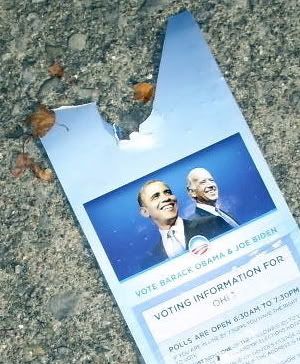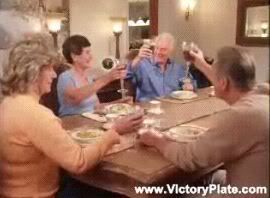The New York Times has an article today called, “How The Movies Made a President,” (which includes a cool slide show). It examines various black archetypes in movies and TV and how they may have helped to prepare the ground for the ascendancy of Barack Obama. I had similar thoughts a few months ago but never got around to making a blog post out of ’em (I know, all the bloggers say that, right?). The article mentions Dennis Haysbert and the show “24” in passing — that was the starting point of my train of thought earlier.
I think the significance of that show is not only that it was popular and that the black President Palmer was a good guy, someone the audience is rooting for, but that Keifer Sutherland’s character Jack Bauer is a pretty Republican character, at core. He’s all about stoppin’ those damn terrorists by any means necessary. This wasn’t some lefty liberal show, at all.
I started thinking about this after seeing a Dennis Haysbert commercial for State Farm. He’s all calm, reassuring authority. I saw the commercial soon after some sort of political television — a debate, perhaps — and I thought at the time that it had to help Obama. There are just all sorts of resonances there. The phrases I transcribed from the commercial at the time were, “If this isn’t a recession, it sure feels like one,” (spoken wryly but seriously by Haysbert, standing in a grocery store) and then the standard State Farm tagline; “Are you in good hands?” Haysbert’s hands, the commercial clearly implies, are very good ones.
As of a year ago, Dennis Haysbert was willing to take some of the credit, too:
“As far as the public is concerned, it did open up their minds and their hearts a little bit to the notion that if the right man came along… that a black man could be president of the United States,” Haysbert, who believes that Obama is the “right man,” said in the January 21 [2008] issue of TV Guide. “People on the street would ask me to run for office… when I went to promote [24].”
[…]
“I think we both have a similar approach to who and what we believe the president is,” Haysbert said in another interview with the Los Angeles Times. “Barack doesn’t get angry. He’s pretty level. That’s how I portrayed President Palmer: as a man with control over his emotions and great intelligence.”
I don’t think anyone’s claiming that there is a direct line from one to the other; that if these black fictional representations hadn’t existed, Barack Obama wouldn’t have won, or that the fictional representations meant that any black politician could make it that far. Obama’s achievement is significant and singular. I do agree with Manohla Dargis and A.O. Scott, though, authors of the NYT article, that
The presidencies of James Earl Jones in “The Man,” Morgan Freeman in “Deep Impact,” Chris Rock in “Head of State” and Dennis Haysbert in “24” helped us imagine Mr. Obama’s transformative breakthrough before it occurred. In a modest way, they also hastened its arrival.
(Another thought I had while reading the NYT article — Michelle Obama is SO Clair Huxtable, isn’t she? Smart, polished, down-to-earth, nurturing, funny…. Is this not a total Clair Huxtable moment?)








